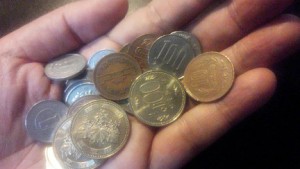I carried a lot of money around today. Woe to anyone who tried to steal it, though. It probably would have given them a hernia.
Today was the day I decided to drain the piggy bank (more on that here) and deposit the contents in a real bank. There were, of course, some complications.
When I first started doing this, my habit was to wait until the jars were full and then take them to the bank, hand them over to one of the nice clerks and then enjoy a book whilst waiting for them to count the change and give me bills, or deposit the money directly to my account and I could extract it at my leisure.
Unfortunately, one day 15 years ago, I handed the change over and the nice clerk suddenly sucked on her teeth and became apologetic (translation: you in trouble, foreign guy). Instead she sent me to the ATM where I was expected to enter the change by hand and let the ATM do the counting (note: Japanese ATMs can take coin deposits). I even tried to stack the coins on the counter and she just kept apologizing.
Unfortunately, the ATM could only take a few dozen coins at a time requiring me to make a few dozen deposits. A half hour and a few dozen swear words later, my account was full of cash and my bank book was full of a several dozen small deposits.
After that, I found a different bank. The only problem there was they charged a few dollars for handling all the coins.
Today actually had a few jobs: Deposit the change in my account; convince a nice clerk to do it rather than me; and take money out as today was also pay day. The problem is, as of Monday, I don’t have a bank card. This meant I needed a nice clerk’s help.
The other problem was the coins were surprisingly heavy and I forgot there isn’t a branch of my bank in my town. This sent me the wrong way at first and then I got to carry the coins to the bank where I’d worked with Miss Patience about my name, address and bank card.
Luckily, after a little explaining, begging and playing dumb, a nice clerk took the change and deposited it for me and I was able to withdraw money for rent and food and taxes. I also have a little for more important things like pens and knives.

